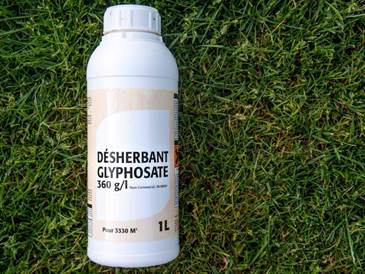Description

Disclaimer: Copyright infringement not intended.
Context
- Recently, the Union Ministry of Agriculture and Farmers Welfare issued a notice restricting the use of glyphosate.
Glyphosate
- Glyphosate is a widely used herbicide that controls broadleaf weeds and grasses. Glyphosate works by blocking an enzyme essential for plant growth. The product is used primarily in agriculture, but also in forestry and lawn and garden care.
Concern
- Glyphosate health hazards for humans and animals. Some 35 countries have banned or restricted the use of glyphosate. These include Sri Lanka, Netherlands, France, Colombia, Canada, Israel and Argentina.
- Health impacts of glyphosate range from cancer, reproductive and developmental toxicity to neurotoxicity and immunotoxicity. Symptoms include irritation, swelling, burning of the skin, oral and nasal discomfort, unpleasant taste and blurred vision.

Approval in India
- In India, glyphosate has been approved for use only in tea plantations and non-plantation areas accompanying the tea crop. Use of the substance anywhere else is illegal.
Illegal Usage
- A 2020 study by PAN India on the state of glyphosate use in the country had worrying findings. Field studies were conducted in Andhra Pradesh, Himachal Pradesh, Jharkhand, Karnataka, Tamilnadu, Telangana and West Bengal.
- Glyphosate was being used in more than 20 crop fields. Majority of those using the weedicide were not trained for doing so and did not have the appropriate safety precautions.
Consequence
- The rampant use of glyphosate in non-designated areas has severe consequences. Use of all weedicides including glyphosate is destroying uncultivated food resources and thereby destroying indigenous nutrition habits as well, making rural people and agricultural communities deprived of adequate nutrition, in addition to polluting ecosystems.
Government’s Recent Notification
- The Government has issued a notice restricting the use of glyphosate.
- The new notification mandates that existing registration certification be put through a further process. Failure to do so will result in appropriate action being taken under the Insecticides Act of 1968.
Wrapping up
- The government needs to come forward to ban glyphosate urgently.
- The government’s current move, to restrict the use of glyphosate, may not necessarily work as the presence of pest control operators is “almost non-existent” on the ground- PAN India Report.
- Allowing continued use of glyphosate in India will contribute to widespread use of illegal herbicide tolerant crops. This will endanger the agroecological nature of Indian farms, apart from spreading the toxic effects to people, animals and the environment.
- A blanket ban on Glyphosate and its strict implementation is the way forward.
https://www.downtoearth.org.in/news/agriculture/centre-restricts-use-of-common-weedicide-glyphosate-citing-health-hazards-85684












